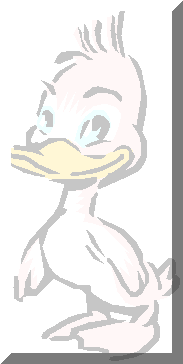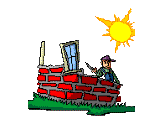



|
|


 |
 |
| Goda & varma vantar väntar! |
Engelsk
grammatik
-English Grammar

Vad roligt att äntligen få lära sig hur det skall vara!
Never forget the fact that learning a language is just like building a house.
If you're old enough to know what a house is like in general terms,
you're also old enough to know where to start, right?
Yes, you start by building a very good and solid foundation.
Anything else is simply a waste of time and money, not to mention wits...

In this section you will find a number of
language exercises,
articles and links to pages and sites covering the various grammar and
vocabulary topics most oftenly confusing
or difficult to both Scandinavians (Swedes, Norwegians & Danes) and
Anglo-Saxons
(Anglo-Saxons= people from the English-speaking countries Australia,
Canada, Ireland, New Zeeland, the United Kingdom and the U.S.A.).

På den här sidan samt underordnade sidor så
kommer du att finna ett antal språkövningar,
förklarande och beskrivande textstycken, sidor och artiklar [samt länkar
till olika sidor och "sajter"
som behandlar de olika grammatikregler och aspekter som så ofta skapar
problem
för både skandinaver och människor från den s.k. "anglosaxiska världen"
(Anglosaxiska världen= Australien, Storbritannien, Canada, Irland, Nya
Zeeland och U.S.A.).
Our grammar will be focusing on verbs,
prepositions and related matters
and the vocabulary will vary from general everyday matters to areas of
concern to us all
such as food (foods,
cooking, eating & recipes), money (business & financce & shopping),
logistics,
cars and
computers.
Vår grammatik kommer att koncentreras på
verb och prepositioner, och ordförrådet kommer att variera
mellan vardagliga företeelser och ämnesområden som berör oss alla
som mat (matvaror, matlagning, ätande och matrecept), pengar
(affärer & finans & ekonomi & att handla i affärer),
bilar och datorer.
There'll be a growing number of interactive language exercises, quizzes and tests for both those who speak Swedish and those who speak English.
Språkövningar för både svensktalande och engelsktalande, tillika med tester och prov av olika slag, kommer successivt att fyllas på "under" den här sidan, och många kommer att vara interaktiva.

The spelling of English words is very inconsistent.
Words of one syllable ending in a single consonant preceded by a single vowel double the final consonant before adding a suffix beginning with a vowel.
hop - hopped, bat - batter, spin - spinning
Words of more than one syllable which are
accented on the final syllabale
and which end in a single consonant
preceded by a single vowel
double the final consonant before adding a
suffix beginning with a vowel.
occur - occurred, admit - admitting
Words ending in 'y' preceded by a consonant change the 'y' to 'i' before adding suffixes.
salary - salaries, marry - married, fancy - fanciful, merry - merriment, lonely - loneliness
NOTE
such as progressive form and simple tense as
differences here have major impact
on meaning and interpretation of
circumstances in question.
The grammar aspect might not necessarily be the
most crucial issue to consider unfortunately,
which otherwise would have
simplified the matter considerably.
-"He's drinking!"- = Han dricker (just nu). / "Kolla på honom!" Han
dricker! (...och det brukar han aldrig göra annars!)
/ Han "tar sig en
hutt" (...och det brukar han aldrig göra annars!). /Han är drickande.
-"She was dying when I arrived."- = Hon var döende då jag anlände./ Hon
höll på att dö (...och bara just då) när jag kom.
(...och kanske, tack
vare att jag dök upp, så ordnade det hela upp sig och hon "hämtade sig"!)
NOTE Note that above examples contain elements of
coincidence, an incident, an occasion, accident etc.
Below you'll
find examples showing the opposite or extreme
where something is
terminated, finished, permanent, "beyond hope and will"!
-"He drinks."- = Han
brukar dricka (jämt). /Han är vanedrickare. /Han super. / Han tittar för
djupt i glasen (vanligtvis). /Han är "drinkare".
-"She died when I arrived."- = Hon dog när jag anlände (kom).
/
Hon avled när jag kom.
COLLEGEPLAN
"""If you have unrestricted Internet access, you may be tempted to use
any source you find online as a basis for your writing."""
A Guide to
Writing for College by Veritas Prep
En "sundae" är helt enkelt en glassefterrätt med frukt eller
fruktsaft
iblandat, ofta dessutom försedd med vispgrädde och
nötter.
![]()

Engelskan är ju konsekvent i detta avseende till
skillnad från svenskan beträffande hantering av namn.
Söndag likväl som
mars och september och Kalle och Sigrid är ju alla namn, och skall också
därmed ha stor bokstav.
Så är alltid fallet i engelskan men tyvärr icke i
svenskan där man använder liten bokstav på såväl dagsnamn, helger som
månadsnamn.
Man kan uttala "Sunday" och "sundae" likadant så det
blir ju den s.k. kontexten, sammanhanget, som avgör betydelsen.
Som svensk
kan man knappast påstå att detta skulle vara en oöverstiglig svårighet
med
uttryck som "Får får får?" eller "Som man får man utstå vad man
förtjänar."
samt ett därmed förknippat språkligt dilemma som "Hästen har
man!"
Nog kan språk synas outgrundliga, ibland...

Now spend a few minutes on your vocabulary and
the word 'chip' (s).
Think of all the
different variations in meaning you can come
up with
(translated into Swedish).
Put the word in context
(Write sentences!). Define the word in each
context.
What are the various meanings of the word
chip/-s you can come up with?
Use both American and British dictionaries.
Without the two you are likely to (you will)
fail.
Is there such a thing
as a chipmunk (chip-muck)?
And what about a 'chip-shot',
where I've heard some people confuse it with
'cheap shot'…?
Numerable are those instances when it's been a
question of trying to establish certainty
as to whether or not somebody means 'who' or
'how'.
I mean if someone asks you "How is it?" or
"Who is it?" obviously might cause some confusion,
especially if you're in a hectic business
environment, or even worse, at an emergency ward.
Having said that, we're getting awfully close
to all those pronunciation errors
basically depending upon difficulties making a correct distinction
between 'sh' and 'ch' leading to 'sheep' becoming 'cheap' or vice versa,
and 'chip' and 'ship' will further complicate the issue.
Stress of syllables
not
taken into consideration as in 'sheet' and 'shit.
You've probably heard about the guy who came
down to the reception desk
of a hotel on the East Coast
trying to get a clean sheet to his bed.
The desk-clerk misinterpreted the whole story
into the more embarrassing idea
that the guest in question had simply "shit in
his bed"…
You've probably heard about ...
-In case that cactus stays (above this line), click your Refresh Button!
The longer the
password,
the better! -Längden har betydelse...
Du SKA använda minst 12 tecken och mixA stoRleken samt ETT PAR
"symboltecken" typ * ^ # £ $.
 |
 |
|

 |
|
 |
|
 |
|
|
 © Swengelsk, KB ® webmaster |
|
|
 |